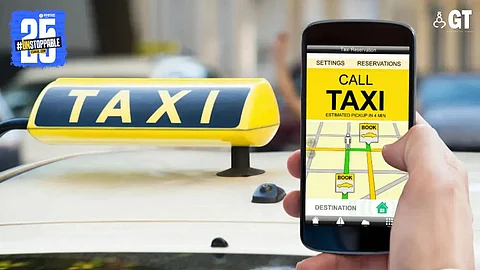

As the State pushes forward with guidelines to introduce app-based taxi aggregators, the heart of the issue is a clash between tradition and technology, between local taxi operators who’ve served Goa’s roads for decades and a government eager to modernise transportation in line with tourist expectations.
The decision to introduce Transport Aggregator Guidelines last month sparked fierce opposition from traditional taxi operators. It's obvious, this tension doesn't bode well for tourists and tourism.
Goa’s decision to liberalise its taxi operations by welcoming aggregators is, many believe, long overdue, and one that not only tourists, but even locals have endorsed. The reason: both Goans and tourists have alleged high pricing by some of the local taxi operators.
On the other side, local taxi drivers, many of whom have been operating for decades and held total control, fear that the arrival of corporate-run aggregators will wipe out their livelihoods.
Goa’s decision to liberalise its taxi operations by welcoming aggregators is, many believe, long overdue
On May 29, the bitter protest in Anjuna reached the local police station after a taxi operator opposed to the guidelines was called in for questioning and declared a history-sheeter.
The action of the Anjuna police intensified anger and distrust, and the simmering protest threatened to spread to the rest of Goa, just as the State had laid out plans for monsoon tourism.
But that escalation never came, partly because it appears a growing number within the local taxi operators' fraternity may accept the inevitability of technology and see potential in adapting to it.
Goa’s tourism industry, which is already grappling with seasonal fluctuations, changing travel trends and competition from other destinations, cannot afford reputational damage. If the standoff continues, the state’s appeal as a friendly, laid-back destination will be hit further.
Goa’s tourism industry, which is already grappling with seasonal fluctuations, changing travel trends and competition from other destinations, cannot afford reputational damage.
At this juncture, a professional local transport system becomes all the more inevitable. However, some taxi operators argue that app-based taxi services thrive in places like Mumbai, Delhi and Pune where demand is high and consistent.
In Goa, the population is widely spread across coastal belts, rural interiors, and small towns. Tourist hotspots like Calangute or Baga may see enough ride requests to sustain aggregator business models, but less frequented areas like Aldona, Agonda, or Quepem may not generate enough business to keep taxis active or profitable.
Secondly, Goa's tourism economy is highly seasonal. While demand may surge between November and March, the monsoon months see a dip in visitors. This irregular demand makes it difficult for full-time aggregators to maintain a stable income throughout the year.
The final notification of Transport Aggregator Guidelines is not yet out. All the above shortcomings can be taken care of, and, ultimately, the final notification must be rooted in Goa’s ground realities, not just broad tech ambitions.
Goa's tourism economy is highly seasonal. While demand may surge between November and March, the monsoon months see a dip in visitors.
On one hand, there is an urgent need to modernise and align with the expectations of domestic and international tourists. On the other, the government cannot simply ignore the concerns of thousands of families dependent on the taxi trade.
The path forward lies in negotiation, not confrontation. The government will have to create an environment where local taxi drivers are included, trained, and integrated into aggregator platforms. And yes, this can happen, only if those among the traditional taxi operators, who are clinging to outdated ways, recognise the need to adapt.
Their resistance, often perceived as arrogance and inflexibility, has already contributed to Goa’s reputational challenges. Change is not just inevitable, it is also essential to preserve the dignity of their profession and the credibility of the destination.
Many of the tourists, who have had their bad experiences in Goa, have accused the traditional taxi drivers of behaving like a mafia, a charge denied by the latter.
Goa needs to settle its taxi issue to restore the confidence of tourists. The destination deserves a transport system that is fair, efficient, and welcoming.
In this context, the way forward must begin with accountability. Traditional taxi operators cannot continue to sidestep their responsibility in shaping a better, more tourist-friendly Goa. It is time they fall in line with evolving expectations, embrace reform, and become part of the solution rather than remain an obstacle.